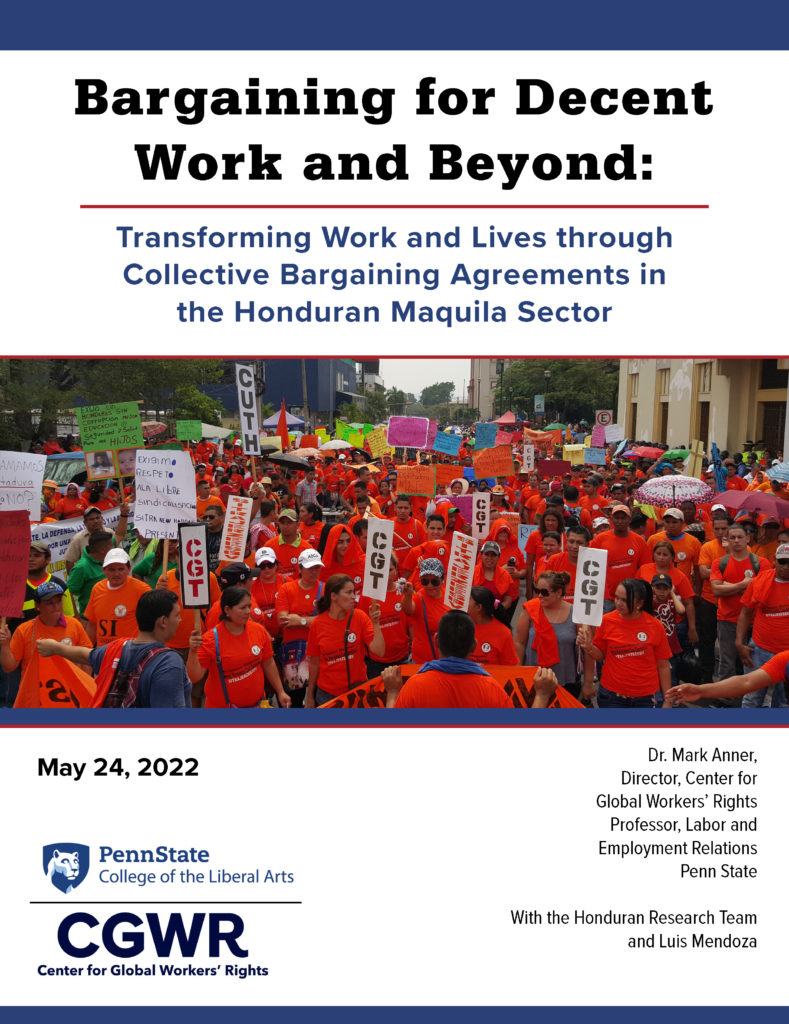University-Driven Russell Pact Sparked Huge Progress for Honduran Workers

| To: | WRC Affiliate Universities and Colleges |
| From: | Tara Mathur and Scott Nova |
| Date: | June 17, 2022 |
| Re: | University-Driven Russell Pact Sparked Huge Progress for Honduran Workers |

A new report from Penn State documents sweeping progress for workers sparked by the positive resolution of university code violations at Russell Athletic. The report, authored by Mark Anner, Director of the Center for Global Workers’ Rights, shows that Honduran garment workers have achieved major gains in wages, benefits, and the reduction of labor rights abuses over the last decade. The report demonstrates that the unprecedented labor rights commitments made by Russell in 2009 to address violations documented by the WRC were the catalyst for much of this progress.
After a WRC investigation documented that Russell had closed a factory to get rid of a union, more than 100 universities, spurred by nationwide student activism, held the company accountable by suspending or terminating its licensing rights.
To its credit, Russell’s parent, Fruit of the Loom, reversed course and signed a historic agreement with the Central General de Trabajadores (CGT) union federation. The company committed not only to reopen the factory and rehire the workforce but to fully respect workers’ freedom of association in all of its factories in Honduras, where it was the country’s largest private employer.
This video provides an excellent overview of these events.
The new report, Bargaining for Decent Work and Beyond: Transforming Work and Lives through Collective Bargaining Agreements in the Honduran Maquila Sector, documents how worker leadership and ongoing scrutiny of Honduran t-shirt factories by the WRC and university codes has built on the 2009 agreement over the past 10 years to bring significant gains for garment workers in Honduras.
The report highlights the following:
- The 2009 agreement has led to workers being able to form unions at not only the Fruit of the Loom owned factories but also at a total of more than 20 factories in the export assembly sector. As a result, approximately 45 percent of Honduran garment workers have the certainty of knowing that they are represented by a union and have improved benefits enshrined in a collective bargaining agreement (CBA).
- These unionized workers have been able to negotiate rates of pay above the regular minimum wage, which is inadequate to meet the needs of workers and their families. They have also helped to ensure significant raises in national minimum wage over multiple years, which has had a positive impact for all garment workers in Honduras.
- When compared with workers at non-unionized factories in Honduras, garment workers covered by a CBA are far more likely to have overtime be voluntary (rather than obligatory), to receive lunch subsidies, to have access to a company savings and loan program, and to have free transportation to and from work. For low wage workers, these benefits are substantial and directly benefit the quality of family life.
- Workers who are employed at a factory covered by a CBA report a significantly reduced incidence of verbal abuse and sexual harassment. Through collective bargaining, many have been able to successfully implement mechanisms to address gender-based violence and harassment in the world of work.
The WRC is the designated monitor of implementation of the 2009 agreement. As such, we have witnessed first-hand the significant improvements outlined in this report. In addition to the quantifiable, economic benefits that are documented in the report, workers frequently speak about how they now feel free to address management about issues related to their salary, health and safety, and other working conditions. They are able to do this safely and without fear of retaliation.
When compared to the reality of garment workers around the world, Honduras stands out for the significant gains that have been won by the workers to improve pay and working conditions. No other country has the same significant percentage of garment workers that are represented by a union and a collective bargaining agreement. The impact on workers that has been documented by Professor Anner and his research team demonstrate what is possible when courageous workers come together to form a union, violations are thoroughly documented, and there is global support. The important role that the universities played and the willingness of Fruit of the Loom to closely analyze its business practices and to take significant remedial action cannot be understated.
We hope that you will enjoy reading the report. As always, we are available for questions or comments.
